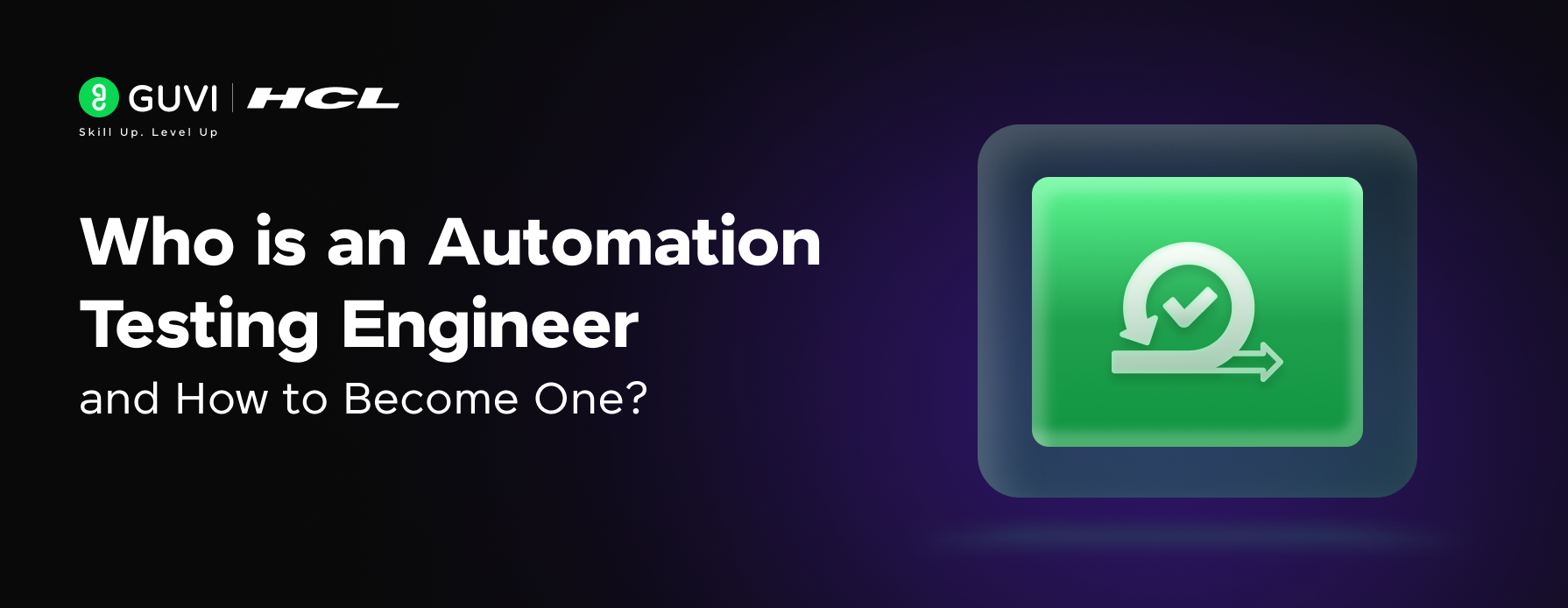
The 8 Essential Skills for a Successful Automation Tester
Mar 08, 2025 5 Min Read 32903 Views
(Last Updated)
Being able to automate tasks is one of the most revered skills in the tech industry, especially if it involves streamlining the rigorous software testing processes and making life a LOT easier for developers and businesses as a whole. Hence, coming in hot are Automation Testers that take place among the most in-demand tech professionals today!
This rise and status is completely justified since automation testing has become a crucial aspect of ensuring the quality and efficiency of software applications. Automation testing helps reduce manual effort, increasing test coverage, and improving overall productivity.
So you know how important and in demand they are, and you’re probably here to know how to master the skills needed to become one. Worry not for in this article, I will cover all the essential skills for a successful automation tester needed to survive in the software Industry. Let’s get right to it.
Table of contents
- Why is Automation Testing Crucial?
- The Skills Needed as an Automation Tester (AT Engineer)
- Analytical Thinking
- Programming Language Proficiency
- Functional Testing Skills
- Test Script Development Expertise
- Clear Understanding of Business Requirements
- Familiarity with Agile, DevOps, and Continuous Delivery
- Effective Communication and Collaboration Skills
- Risk Assessment and Mitigation
- To sum it all up...
- What skills do you need for an automation testing resume?
- What is the key skill for an automation tester?
- Does automation testing require coding skills?
- What skills are hard to automate?
Why is Automation Testing Crucial?

Automation testing is the key factor that results in the success of the software industry. It allows businesses to expand their reach to a larger audience while saving time and effort and the always important ‘MONEY’.
By automating repetitive tasks, automation testing enables testers to focus on more critical aspects of the application, such as functionality, performance, and security. This leads to faster delivery of high-quality software, which is essential in today’s competitive market.
Automation testing also plays a significant role in the adoption of agile methodologies. By replacing manual testing processes with automation, organizations can ensure faster feedback loops, quicker bug fixes, and seamless integration with continuous delivery pipelines.
This accelerates the software development lifecycle and helps organizations stay ahead of their competitors which i the main goal of a business.
Before we proceed further, it’s essential to have a solid foundation in automation testing principles and selenium basics. If you’re eager to dive deep into software testing, consider joining GUVI’s Selenium Automation Testing Course. In this program, you’ll learn the fundamentals of Selenium, Python, Java, Jenkins, JMeter, API Testing, and more. Gain hands-on experience with industry-standard tools and techniques to get into a professional career focusing on the quality of Product & Process development.
Also, if you want to explore Automation Testing with Python through a Self-paced course, try GUVI’s Selenium Automation with Python certification course.
The Skills Needed as an Automation Tester (AT Engineer)

Automation Testers are also known as Automation Testing Engineers but it’s just like tomato toh-ma-to because they have the same roles and responsibilities and a similar skillset.
So, to excel as an AT Engineer, one must possess a combination of technical expertise, domain knowledge, and testing skills. Let’s discuss them at length:
1. Analytical Thinking
Analytical thinking is a vital skill in automation testing. What this means is you must have the ability to analyze complex problems, break them down into smaller components, and identify the most effective solutions. Automation testers must possess an instinct for analytics and a logical approach to problem-solving.
They should be able to understand the business requirements and translate them into effective test strategies. Analytical thinking helps automation testers in designing test cases, identifying areas for automation, and ensuring optimal test coverage.
2. Programming Language Proficiency
As an automation tester, you should be good with programming languages. Most automated testing tools use programming languages like Java, Python, Ruby, Perl, or VB script. Familiarity with these languages is a must as automation testers need them to design and develop efficient test scripts.
While it may not be necessary to have expert-level coding skills, a solid understanding of programming concepts is essential. Automation testers should be able to write clean and maintainable code, adhere to coding standards, and debug test scripts when necessary.
3. Functional Testing Skills
You must build a deep understanding of functional testing as automation testers must be well-versed in manual testing processes, test techniques, and the software testing life cycle (STLC).
Functional testing skills enable you as an automation tester to design effective test cases, ensure comprehensive test coverage, and identify potential defects in the application.
Additionally, domain knowledge related to the application being tested is beneficial, as it helps automation testers understand the business requirements and design accurate test scripts.
4. Test Script Development Expertise

Automation testers should have expertise in developing test scripts. The ability to create efficient and reusable test scripts is essential for maximizing the benefits of automation testing. Different automated testing tools have different approaches to test script development.
For example, tools like Selenium WebDriver require programming knowledge, while tools like Cucumber allow test scripts to be written in plain English language. Automation testers should be well-versed in the chosen automation tool and use it effectively to design test cases.
They should be able to create test scripts that cover various functionalities of the application and ensure optimal test coverage.
5. Clear Understanding of Business Requirements
It is crucial for you to have a clear understanding of the business requirements pertaining to the application under test. This includes understanding the application’s functionality, user expectations, and business goals.
Having a thorough understanding of the business requirements helps automation testers design accurate test cases, identify potential risks, and ensure that the application meets the desired quality standards.
You will also be required to actively communicate with stakeholders, ask relevant questions, and seek clarifications to gain a comprehensive understanding of the business requirements.
6. Familiarity with Agile, DevOps, and Continuous Delivery
Automation testing is closely associated with agile methodologies, DevOps practices, and continuous delivery. Automation testers hence should be familiar with these concepts and understand how automation testing fits into these frameworks.
They should be able to automate test cases to support frequent requirement changes, integrate automated tests with continuous integration tools like Jenkins or GitLab, and contribute to the overall DevOps process.
Familiarity with agile, DevOps, and continuous delivery principles enables automation testers to align their testing efforts with the development and delivery processes, ensuring faster and more efficient software releases.
Seem a little complex? But it will be worth it if it pays you upwards of 6.5 Laks per year!
7. Effective Communication and Collaboration Skills

Possessing strong communication and collaboration skills is a must for most careers but more so as an automation tester. They need to interact with various stakeholders, including developers, business analysts, and other members of the testing team.
Effective communication helps automation testers understand the requirements, clarify doubts, and ensure that everyone is on the same page. It also enables them to report test results, share insights, and discuss the overall progress of testing efforts.
Collaboration skills help automation testers work effectively in a team, contribute to agile ceremonies, and actively participate in discussions related to test strategy, test planning, and defect resolution.
8. Risk Assessment and Mitigation
You need to be skilled in assessing and mitigating risks associated with the automation testing process. AT Engineers should be able to identify potential risks, analyze their impact on the testing efforts, and develop mitigation strategies.
Risks in automation testing can include changes in interfaces, business logic, or the testing environment. Automation testers should proactively monitor the test execution process, report any issues or anomalies, and work with stakeholders to address them effectively.
By identifying and mitigating risks, they ensure smooth and efficient test execution, reducing the chances of delays or failures in the testing process.
To sum it all up…
Becoming an efficient and successful automation tester will require you to be a quick thinker and a passionate learner since something new keeps popping up every now and then. Automation testers should possess analytical thinking, programming language proficiency, functional testing skills, and test script development expertise along with DevOps.
You must keep in mind that automation testing is not just about writing test scripts; it is about ensuring the quality and efficiency of software applications.
By acquiring and honing the essential skills we discussed in the article above, you as an automation tester can drive innovation, improve testing processes, and deliver high-quality software that meets the needs of end-users and stakeholders alike.
The software industry is evolving rapidly and will keep doing so, and automation testing shall always stand at the forefront of this transformation. With the right skills and expertise, you can make a significant impact, contribute to the success of software development projects, and build a highly rewarding career. Good luck on your exciting journey!
Enroll in GUVI’s Selenium Automation Testing Course to get your software testing career off to a great start. Here, you can master in-demand skills like Selenium, Python, Java, Jenkins, JMeter, API Testing, and more.
Alternatively, if you want to explore Automation Testing with Python through a Self-paced course, try GUVI’s Selenium Automation with Python certification course.
To create a great automation testing resume, emphasize these skills:
Programming Proficiency: Establish yourself as an expert in scripting languages like Python, Java, or Ruby.
Test Automation Tools: Highlight experience with tools such as Selenium, Appium, or TestComplete.
Version Control: Mention your proficiency in Git for code management.
Test Frameworks: Make sure to highlight knowledge of testing frameworks like JUnit or TestNG.
Scripting and Debugging: Highlight your ability to write efficient scripts and troubleshoot issues.
Test Case Design: Emphasize your capability to create comprehensive test cases.
Test Reporting: Include expertise in generating test reports using tools like Extent Reports.
Agile Methodology: Mention your ability to work effectively in Agile/Scrum teams.
The most important skill for an automation tester is proficiency in coding and scripting languages, such as Python, Java, or Selenium. This skill enables them to write robust and efficient test scripts for automating software testing processes. Additionally, a deep understanding of testing methodologies, software development life cycles, and problem-solving abilities are vital to excel in this role.
Test automation is all about creating scripts to simulate user interactions as well as verifying software functionality and you can’t write scripts if you don’t possess any coding skills. Coding is essential for writing and maintaining these scripts, as well as for handling variables, conditions, and data input/output. Proficiency in programming languages like Python, Java, or JavaScript is a must to build a successful career as an automation tester.
Skills that have constantly proved to be difficult to automate typically involve complex human interactions and nuanced decision-making. These include emotional intelligence, creativity, critical thinking, and adaptability. Jobs requiring empathy, like healthcare or counseling, remain reliant on the human touch.
















Did you enjoy this article?